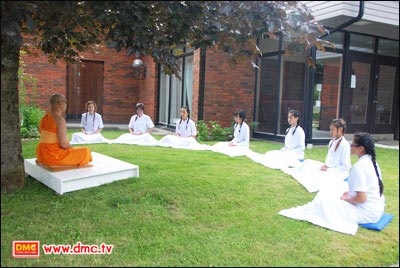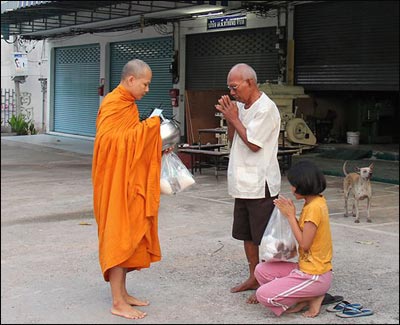Respect # 1
Buddha one who became enlightened without Teachings.
“Before we can receive the benefit of an item, we need to know the value of that item.
Likewise, before a person receive benefit from others they need to respect them. Some necessities are needed for long-travel.
Likewise, being wise is needed for establishing a good path in life.”
What is respect?
Respect means becoming aware of others’ virtue and truth, honouring their good deeds and appropriately expressing sincerity with modesty and courteousness whether or not you are in their presence.
Materials on earth have their own properties. If someone knows the true properties of a material, the material can be very beneficial. For example, a scientist who knows the properties of Radium can use it to cure cancer.
However, it is very difficult to know the true property of materials. It is in the nature of a wise man or sage to know the value of things.
Likewise, people have different levels of goodness. Some have more or less than others. The person who realizes the goodness of others can truly benefit from cultivating that goodness in oneself. Seeing the goodness in others is even more difficult than seeing the property of a material because we are veiled from our own perceptions by the impurities in our minds such as disparaging thoughts, ignorance, or arrogance. It makes us unable to see the goodness in others and think that nobody else is good.
Therefore, the people who are wise enough to acknowledge the goodness in others are truly special because their minds are in a higher level that is free from arrogance. They are open and ready to cultivate the goodness of others in themselves. These people are people worthy of respect.
Dhamma Teachings of the Buddha which lead to enlightenment.
Objects Worthy of Respect
In this world, there are many people, animals, objects, events, work, and an uncountable amount of other things that are related to us. However, the Lord Buddha advised us to show respect to and realize the value of even things:
1. Buddha one who became enlightened without Teachings.
2. Dhamma
- Teachings of the Buddha which lead to enlightenment.
- The constituent factors of the experienced world.
3. Sangha
- Sangha means the monastic Sangha of ordained Buddhist monks or nuns.
- A fourfold Sangha of bhikkhus, bhikkhunis, upasakas and upasikas. They are members of the monastic community and laypeople and all Buddhist practitioners.
4. Education
5. Meditation
6. Non-recklessness
7. Hospitality
meditation
1. Respecting the Buddha means becoming aware of His goodness or virtues which in short, is His wisdom, purity and kindness. One can pay respect as follows:
When the Lord Buddha was still alive, disciples would pay respect by:
1. Going for audience with the Buddha three times a day:
2. Not wearing shoes when the Buddha was bare-foot.
3. Not walking in a place higher than where the Buddha was standing.
4. Not sitting in a place higher than where the Buddha was sitting.
5. Not wearing one’s robe in a manner as to cover both shoulders when within the buddha’s sight. To cover both shoulders in the time of the Buddha was the style of dressing used by Leaders. Thus if the Buddha was already sitting as president of any event in any particular place with one shoulder ‘open’, it would not be suitable for others to keep both shoulders covered.
6. Not wearing shoes within the Buddha’s sight.
7. Not opening an umbrella or parasol within the buddha’s sight.
8. Not passing water or defecating within the Buddha’s sight.
When the Buddha entered Parinirvana, one pays respect by:
1. Respecting pagodas containing the Buddha’s relics.
2. Paying respect at the four holy sites of Buddhism: where the Buddha was born, enlightened, gave his first sermon, and passed away into Parinirvana.
3. Paying respect to Buddha images, as objects that remind us of the Great Teacher.
4. Paying respect before the main shrine of a temple.
5. Not wearing shoes on the ground of a pagoda.
6. Not opening an umbrella within the grounds of a pagoda.
7. Not chattering while walking within the grounds of a pagoda.
8. Putting down one’s umbrella and removing one’s shoes when entering the grounds of a temple and maintaining modesty and respect from the time one enters the temple grounds until leaving it.
9. Practicing what the Lord Buddha taught.
Not wearing shoes when the Buddha was bare-foot.
2. Respecting the Dhamma means becoming aware of the great benefits of the Dhamma, the Lord Buddha’s teachings and paying respect by:
1. Listening to Dhamma teachings when the opportunity arises
2. Listening to Dhamma teachings attentively, serene and peace fully
3. Not falling asleep, chattering or daydreaming while listening to Dhamma teachings
4. Not putting books containing Dhamma teachings at inappropriate locations and taking respectful care of the books.
5. Not making fun of the Dhamma.
6. Carefully and accurately teaching the Dhamma to others.
Meditation - Related Articles
" />
" />









